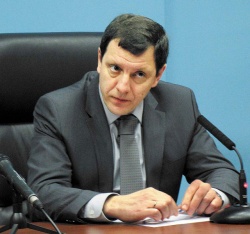A full ban on state purchases of foreign antiviruses and workflow systems is being prepared.
 It would seem that the topic of software import substitution in Russia has recently subsided, but it was a false impression. The Center of Competences on Import Substitution in the Field of ICT (CCIT), headed by Ilya Massuh, continues to be active (in the photo).
It would seem that the topic of software import substitution in Russia has recently subsided, but it was a false impression. The Center of Competences on Import Substitution in the Field of ICT (CCIT), headed by Ilya Massuh, continues to be active (in the photo).
TsKIT did not abandon its plans for importing telecom equipment and foreign software. The latter is especially important, because now 77% of all software purchased by government agencies is foreign. But soon the situation will change dramatically.
In the near future, the authorities intend to impose a complete ban on government procurement of foreign antiviruses, electronic document management systems and bookkeeping. Ilya Massuh said this yesterday at the conference "Russian software: effective solutions."
“Recently there was a meeting with [Deputy Prime Minister] Arkady Dvorkovich on the topic of import substitution, almost all the departments participated, the protocol was issued. According to the protocol which items? Restrictions will soon be included in the government resolution. The first point is the access to the domestic market of solutions from EurAsEC. The second point is a ban on the purchase of imported software in the field of antivirus, electronic document management systems and accounting. There will be a total ban for the authorities introduced, ”the RBC agency reports the words of Ilya Massukh.
TsKIT also proposes the creation of a laboratory in Russia for testing and testing domestic software. This laboratory should check the quality of Russian software created as a replacement for foreign analogues - and give its recommendations on its use in government agencies. We are talking about tenders and public procurement of billions of rubles, so the question is very serious. For example, in 2015, the volume of software purchases by Russian government agencies amounted to 93.9 billion rubles, of which 77% came from imported products, mainly from Microsoft, Oracle, IBM, Symantec, Dell EMC and German SAP.
Of course, the laboratory must make extremely fair and objective verdicts and not allow the possibility to give multi-million contracts to "friendly" companies for kickbacks, as has sometimes happened in the past. Indeed, in this case, the so-called "cut" of budgetary funds.
Recall that after the appearance of concerns about the leakage of confidential information from US government agencies through Kaspersky Anti-Virus, the US authorities banned the use of Kaspersky Anti-Virus in US federal agencies . It is known that Kaspersky Anti-Virus sends signatures of suspicious files to the Russian network . Moreover, “for the purpose of preventing and investigating incidents that have occurred, executable and non-executable files, parts of the computer’s RAM, boot sectors of the operating system, as well as reports on application activities” can be sent (quoted in the Kaspersky Security Network Regulations).
As a result, Kaspersky Lab products have been removed from the lists of approved suppliers for centralized procurement of process equipment in the Information Technology Services and Digital Photographic Equipment categories.
If the Russian authorities introduce “counter-sanctions”, they will affect not one separate Western program, but entire classes of software from dozens of manufacturers, even if these programs do not have such potential spyware potential as in Kaspersky Anti-Virus.
A partial ban on government procurement of foreign software has been in effect since January 1, 2016, but in practice it does not work very effectively, because current legislation leaves a loophole for the purchase of foreign software in the case when "there are no Russian analogues or they do not have the necessary functions." Now the Unified Register of Russian programs for electronic computers and databases is maintained by the Ministry of Communications and Mass Media. It already has about 3,900 domestic programs.
“There are two Russian anti-viruses that are in demand around the world. Dozens of domestic document management systems that are implemented in the largest organizations. Despite this and the regulations on the priority of domestic software, purchases of foreign analogs continue in these classes, ”Yevgeny Vasilenko, director of the Association of Software Developers of Domestic Software, outraged. He stated that nowadays companies often continue to support the implemented foreign systems, although “often the introduction of domestic solutions at a price equals support and maintenance of foreign ones”. The ban on government procurement of foreign antiviruses, workflow and accounting systems will solve this problem.
The main thing is that such “counter-sanctions” do not harm Russian users, so that the effectiveness of their work does not decrease and they do not incur additional costs. Otherwise, it turns out that counter-sanctions are directed not against foreign companies, but against their own population. And, of course, I would not want the sanctions to be extended to private Russian companies in the future.
All Articles